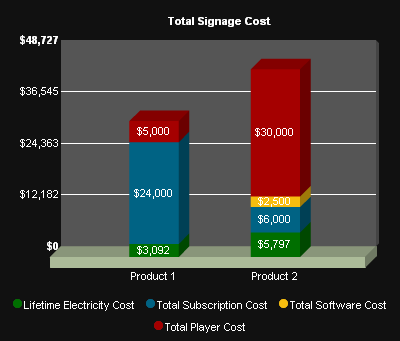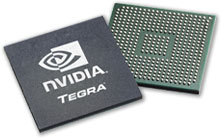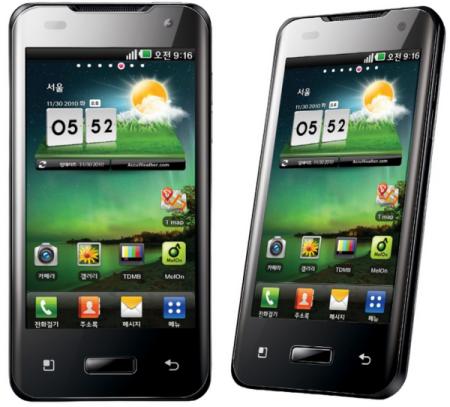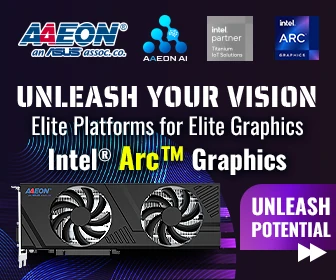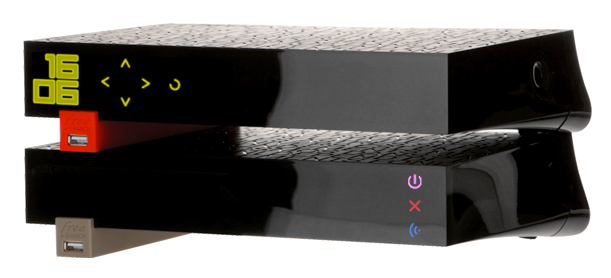AMX has recently released a Total Cost of Ownership Calculator for digital signage comparing two different setups by taking into account the following parameters: Digital Signage Requirements: Number of Players Hours per Day Days per Week Weeks per Year Expected life in years US State Deployed (For electricity rates) Cost of Development for 2 products: Media Player Cost Per Unit Initial Software Cost Initial Subscription Fee Monthly Subscription Fee Energy Efficiency: Player Power Consumption in Watts Hardware Design: Type of storage: Solid State / Hard Disk Fan: With or Without The result of the calculation will show you the total cost in a graph, with the lifetime electricity cost, total subscription cost, total software cost and total player cost. If you purchased the players and plan to manage the devices by yourself, you won’t have to pay any subscription fees. However, you’ll still have to consider the maintenance costs. In […]
Resources for NVidia Tegra 2
NVidia Tegra 2 is currently one of the most powerful processor used in smartphones and tablets such as the upcoming LG Optimus 2X smartphone or the new version of Samsung Galaxy Tab. NVidia describes the processor as follows: NVIDIA® Tegra™ 2 is the world’s most advanced mobile processor, featuring the world’s first mobile dual-core CPU for up to 2x faster Web browsing; the world’s only ultra-low power (ULP) NVIDIA® GeForce® GPU for up to 5x faster gaming; and the world’s first mobile 1080p HD video processor for flawless HD video conferencing and playback. Get never-before-seen experiences on a mobile device with NVIDIA Tegra. NVidia Tegra 2 is based on a dual core Cortex A9 running up to 1GHz, supports 32-bit DDR2 RAM and features NVidia Geforce GPU with OpenGL ES 2.0 support. Contrary to many other companies finding the development kit, documentations and tools is straightforward. Once you get to […]
LG Optimus 2X Teaser Video – LG SU660 – LG P990
As you probably know LG announced their Optimus 2X smartphone based on Nvidia Tegra 2 earlier this week. I’ve just come across a Korean website showing LG teaser video/advertisement. Watch it below.
An Update for Qualcomm Augmented Reality SDK and Extension for Unity is Available
Qualcomm has just released their new Augmented Reality SDK with Unity Support: We encourage you to upgrade immediately to the newest version of Qualcomm’s augmented reality (AR) software development kit (SDK) and Extension for Unity released today, Friday, December 17. This version includes support for virtual buttons and multi-image targets and improved stability for both the SDK and the AR Extension. Additionally, we are pleased to announce that the Qualcomm AR SDK now supports several new devices including the Dell Streak, HTC Desire HD, HTC Desire Z, T-Mobile G2 by HTC, HTC myTouch 4G, Motorola DROID 2, Motorola DROID X, and Sony Ericsson Xperia X10. Download the latest Qualcomm SDK and Extension for Unity at developer.qualcomm.com/ar AR SDK version 0.10.0 (BETA2) Changelog: Added support for multi-image target reconfiguration (add / remove / reconfigure parts on the fly) Added support for virtual button reconfiguration (add / remove / reconfigure buttons on […]
Embedded Systems Hardware & Software Trends for 2011
VDC Research – a US company specialized in technology market intelligence – recently released two reports about embedded systems trends for 2011. The first report focuses on hardware and the second on software. The first report entitled “Top 10 trends for the embedded hardware and systems market in 2011” listed the following trends: COMs gain traction as time-to-market accelerators for OEMs By combining COM express modules with off-the-shelf COMs, suppliers are able to offer several different configurations of CPU boards and leverage COMs’ interchangeable characteristics. CPU vendors can thus offer a fairly wide range of boards without incurring high design and inventory carrying costs. PC/104 module family under pressure Although VDC data projects the PC/104 family will experience a single-digit rebound from the low points of the recent recession, vendors will have to commit resources to develop newer strategies in order for this technology to remain viable. Otherwise, the recovery […]
LG Optimus 2X – First Dual Core NVidia Tegra 2 Smartphone
LG has just introduced the Optimus 2X (codenamed the LG Star), the first smartphone to run a dual-core processor namely Nvidia Tegra 2 @ 1GHz. The device will be initially available in Korea (Model: LG-SU660) in January 2011, and later in the year in Europe, then the rest of Asia (Model: LG-P990). LG Optimus 2X will be shipped with Android 2.2 upgradeable to Android 2.3 (Gingerbread). The phone features a 4-inch WVGA screen, 8GB of internal memory, microSD support (up to 32GB), HDMI output, Digital Multimedia Broadcasting (DMB), DLNA support, an accelerometer, a gyro sensor, 1080p MPEG-4/H.264 playback and recording and finally 2 cameras: an 8 megapixel back camera plus a 1.3 megapixel front camera for video calls. Please see the video below where the Optimus 2X is compared to the iPhone 4 and the Samsung Galaxy S. The LG Star is really the clear winner in terms of performance. […]
Freebox Revolution Set-Top Box: Internet, TV, VoIP, Mobile and Gaming
Free (Iliad) has just announced the Freedom v6 Révolution on the 14th of December 2010. This solution that offers 28 Mbps internet access, digital television (IPTV/DVB), telephony (DECT, VoIP, Mobile…), Network Access Storage (NAS) and Gaming is actually based on two boxes designed by Philippe Starck: Freebox server: Handles networking (ADSL 2+ /wifi), NAS, telephony… Freebox player: Handles multimedia functions with the blu-ray player, digital television support… Free also released the technical specifications for both devices: Technical Specification of Freebox Server ADSL / ADSL2+ ANSI T1 413 / ITU G.992.1, G.992.3, G.992.5 Annex A 4 Ethernet ports 10 / 100 / 1000 Base-T SFP Port 2 USB 2.0 Ports e-SATA Port Stereo audio input/output with integrated speakers FXS Port (Telephony) WiFi 802.11b/g/n 3×3 450 Mbps 2.4 Ghz Base Station DECT CAT I/Q Internal 250 GB Hard Disk ARM9 Processor @ 1.2GHz with 512 MB RAM Noise < 37dB (while HDD […]
Building Archos Gen8 Source on Ubuntu 10.10
[ad#Google Adsense-Leaderboard] In a follow-up post of GPL Source code and SDE for Archos Gen8 Devices earlier today, here are the steps I followed to build the toolchain, kernel and root file system with buildroot on Ubuntu 10.10 Desktop version: Extract the source code: tar xzvf ../Downloads/gen8-gpl-froyo.tgz Install extra packages for the build: sudo apt-get install flex bison build-essential zip curl libmpfr-dev libmpfr1ldbl automake autoconf libtool gettext texinfo Run the build to generate the toolchain, kernel and root file system: cd gen8-gpl-froyo/buildroot sudo make Then wait for a while (It took 1h15 on my machine) to get the binary images: zImage (kernel) in buildroot/linux/arch/arm/boot rootfs.arm.squashfs (rootFS) in buildroot/binaries/uclibc


